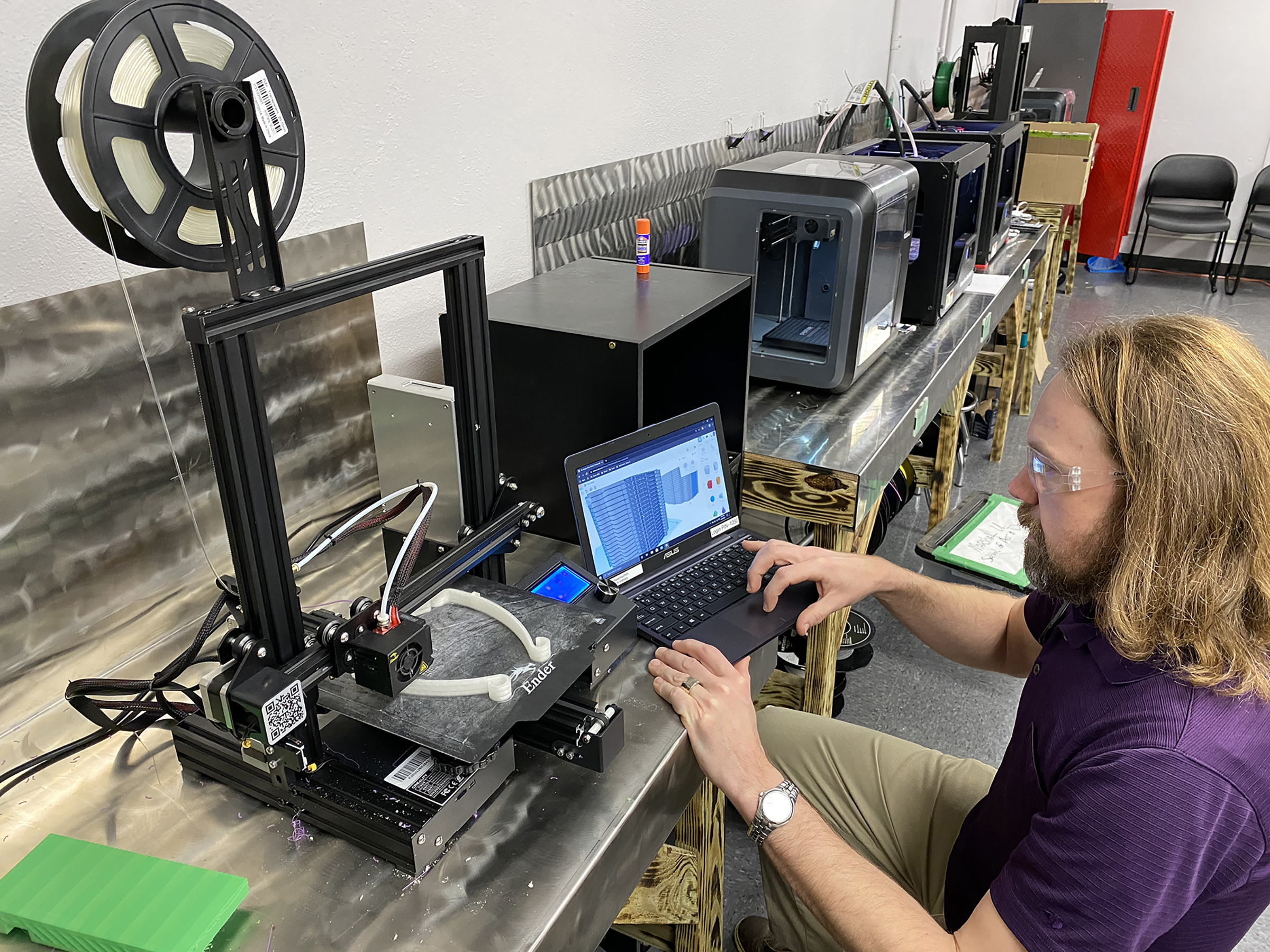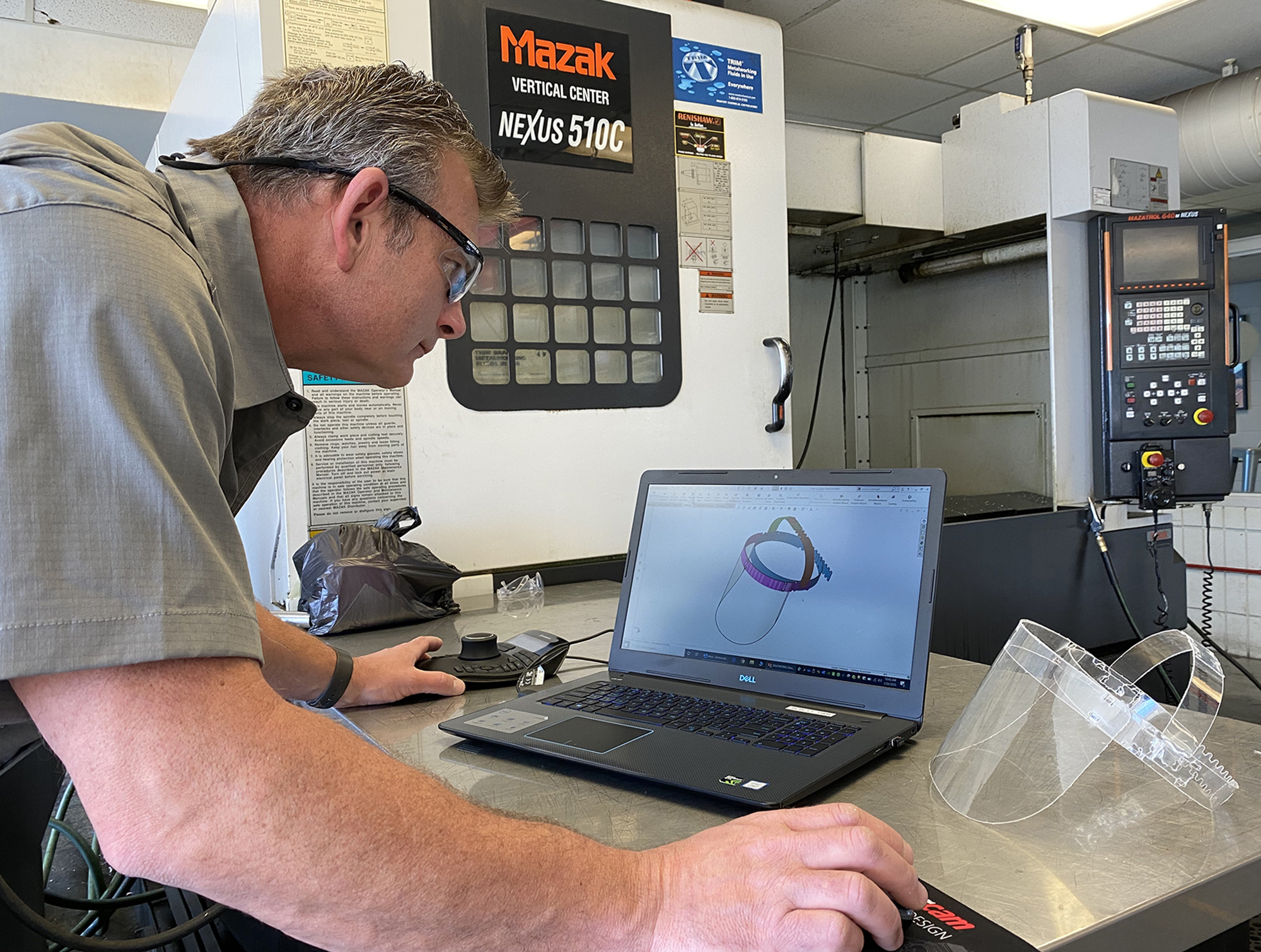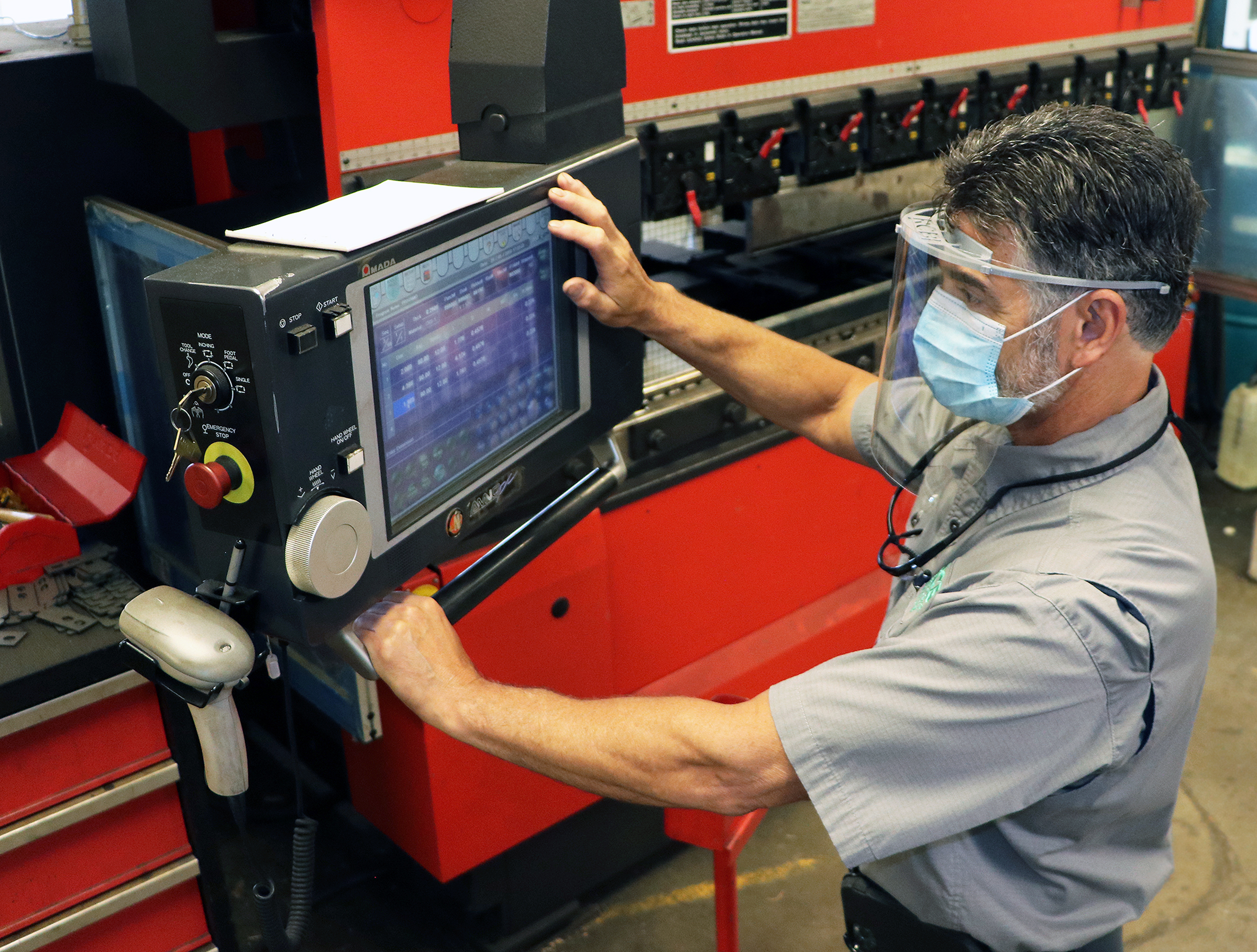RCBI focuses innovation and technology on fight against COVID-19 pandemic
The novel coronavirus pandemic swept around the globe, disrupting supply chains and social norms in its path. This health care crisis was not exactly the situation the Robert C. Byrd Institute (RCBI) was created to handle. Fortunately, RCBI was born to innovate.
The researchers who proposed RCBI envisioned an economic catalyst that would provide advanced technologies and training to West Virginia’s entrepreneurs, start-ups and manufacturers. The program started in Huntington in 1990. Under the leadership of Director Charlotte Weber since 1996, the program has expanded to locations in Charleston, Bridgeport, Williamson and Welch.
To help its community cope with the pandemic, RCBI would need to call on its adaptable problem-solving abilities.

Protective gear prototype to production – fast!
Personal protective supplies from hand sanitizer to face masks were in high demand and short supply. Having worked with RCBI on previous projects, the West Virginia National Guard contacted the program about securing more badly needed face shields.
RCBI was one of the first facilities in the state to acquire 3D printers. The printers could make more, but the conventional production method took time – another commodity in short supply for front line responders.
“One of the things we do at RCBI is develop prototypes,” said Charlotte Weber, RCBI Director & CEO. “We have extensive manufacturing experience, and our team jumped in to begin producing personal protective equipment. We worked with others from across the State of West Virginia, created innovative designs, tested different materials, and pivoted manufacturing processes to produce the personal protective equipment quickly and efficiently.”
Also complicating RCBI’s emergency response was having only limited staff at hand. RCBI remained open, but like many operations in the state, reduced onsite staff to protect the safety of employees and clients.
“I am extremely proud of RCBI’s emergency response to West Virginia’s shortage of personal protective equipment,” Weber said. “We had to rotate staff with some working from home, coordinating response using phones, email and videoconferencing technology and then creating designs that ultimately would be sent to RCBI’s Technical Services Centers where essential staff turned the designs into prototypes and eventually produced the needed personal protective equipment.”

Advanced technology plus creativity leads to innovative solutions
RCBI decided to respond to the critical need for personal protective equipment. The program rallied 3D printing, laser-cutting technology and staff expertise from its Huntington and Charleston Advanced Manufacturing Technology Centers.
Printing facemask shields one at a time is a slow process.
“While the actual print time doesn’t vary from producing one piece or 100 pieces, the time savings accrue from not having to stop and restart the printing process between each individual frame being produced,” said RCBI Director of Communications Mike Friel. “This continual-print aspect results in a time saving of at least 10 minutes between each frame you print.”
Deacon Stone, who manages RCBI’s Center for Innovation, pioneered a method to 3D print a stack of multiple face shield frames at once, instead of one at a time.
“Our unique innovation transforms a typical one-off 3D printer into a production line,” Stone said. “This approach has allowed us to produce 100 face shield frames in under 24 hours, using only four machines.”
Completing the protective face covering requires a shield. Jerry Jefferson, a CNC machinist at RCBI, outfitted the frames by using an Amada Pulsar 4000-watt Laser Cutting System to shape polycarbonate material into shields. He created a version of the face shield that can be manufactured entirely using RCBI’s laser cutter.
“We can cut the components for an entire face shield in two minutes, and we can cut roughly 200 of them from one sheet of polycarbonate,” Jefferson said.
The initial design worked. Other staff improved on subsequent versions by designing 3D-printed devices that attached to the face shield frames to make them fit better.
RCBI produced a demonstration video of Stone’s technique, complete with links to the computer files and instructions. The video “3D Print STACKING – MASS Manufacturing Medical Protective Equipment” appears on YouTube.
“The video has been viewed by more than 5,100 people,” said Friel. “The video and instruction will empower thousands of others to use our innovative approach to assist people in need of personal protective equipment around the world.”
Like others pitching in to help fill the demand for protective devices, RCBI ran into challenges of high demand and short supply for essential raw materials. Although RCBI had reached out to suppliers early on, it still was unable to secure a sufficient supply of items such as the plastic used to make the shields. Fortunately, RCBI manufacturing technicians were able to devise a solution.
“We noticed that the clear plastic that is in such short supply is very similar to sheets we use as a printing bed in our largest 3D printer,” Friel said. “Therefore, we pivoted to using that material instead to produce many of the shields.”
In addition to face shields, the RCBI team worked to produce N-95 style facemasks, designing and 3D printing a mold that could be used to make the understocked and often unavailable masks faster.
While helping produce masks to protect against the coronavirus, RCBI also worked to fulfill its educational role.
“One of our major hurdles was developing a safe way for students in our machinist and welding programs to complete the hands-on portion of their educational programs,” Friel said. “By staggering schedules and assigning students to specific pieces of equipment, we were able to help them complete their training. They took online courses and participated in webinars for courses that don’t require hands-on practice.”
RCBI discovered that its popular series of 3D Printing & Maker Camps transferred well to online delivery. The students used the same design software as they would have in an onsite class, enabling them to experience the same outcome of having a 3D-printed and laser cut object that they created virtually.
“The only difference,” said Friel, “was we had to mail them their creations instead of campers simply taking them home with them.”

Innovating new paths to success
RCBI has produced nearly 1,500 masks and face shields to date, and the work continues. The program manufactured face shields and 3D-printed N-95 type masks distributed to the West Virginia National Guard for distribution to critical-needs areas across the state. In addition, RCBI provided personal protective equipment to health care facilities and other service agencies struggling to find adequate supplies, including shields for St. Mary’s Medical Center’s Cardiac Stepdown Unit, Hospice of Huntington and Necco Foster Care.
“COVID-19 has forced us all – RCBI staff, business owners, members of the community – to think in new ways, become more agile, react and respond quickly and take decisive action because your life or that of others may depend on it,” said Weber. “The core of our existence is to find new and innovative ways of doing things. This pandemic has amplified these efforts.”
For Weber, the pandemic reinforced the need to have a continuity plan ready to implement to get through a crisis.
“A solid plan addresses teamwork, coordination and collaboration strategies,” she said. “because they are essential elements to ensure your business responds, recovers, succeeds and – we hope – thrives.
“I will also add that a true silver lining to this pandemic has been the many, many of us – from the Governor’s office, the National Guard, state and federal agencies, academia, private businesses – coming together to help fellow West Virginians and fellow Americans in need.”

